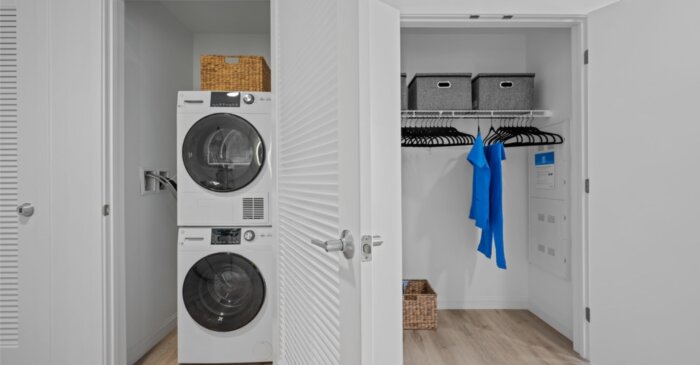When you’re on a long-term business trip, in the middle of a home renovation, or undergoing medical treatment, finding a place to stay can feel pretty stressful.
That’s where temporary housing comes in. It gives you all the comforts of home without the commitment of a long lease or the cramped quarters of a hotel room.
But what exactly is it, and why do so many people choose it over more traditional options like hotels? Let’s break it down and see why temporary housing might be just what you need.

What is Temporary Housing?
Temporary housing refers to accommodations that are available for short-term stays, usually ranging from a few weeks to several months.
Unlike traditional rentals that typically require long leases, temporary housing is designed for people who need a place to stay for a limited time. These types of housing options are fully furnished, include all the important amenities, and are meant to feel more like a home than a hotel.
Temporary housing comes in many forms, including serviced apartments, corporate housing, and short-term rentals. What makes these options so appealing is that they are flexible and comfortable, and great for either personal or business travel.
Whether you’re in between homes, on a temporary work assignment, or managing a long-term medical stay, staying in temporary housing means you’ll have a comfortable place to live without being tied to a lengthy lease.
Why Choose Temporary Housing Over Hotels?
Hotels are great for quick trips, but for longer stays, they can feel cramped, expensive, and impersonal. That’s where temporary housing shines—it offers a more homelike environment with extra space, privacy, and the flexibility to settle in for as long as you need.
Let’s break down the key differences between temporary housing and hotels:
| Feature | Temporary Housing | Hotel |
|---|---|---|
| Cost | More affordable for extended stays | Can become expensive over time |
| Space | Full apartment with kitchen, living area, etc. | Typically a single room |
| Amenities | Fully furnished, includes kitchen and laundry | Basic amenities, often with extra fees |
| Flexibility | Short-term stays with flexible lease options | Rigid booking timelines |
| Privacy | Feels like a private home | Less privacy due to daily housekeeping |
Choosing temporary housing over a hotel means you get more space to live, work, and relax. You can cook your own meals, do laundry, and even invite friends over—all things that are hard to do in a hotel. And if you’re staying for an extended period, the cost savings really start to add up.

Who Uses Temporary Housing?
Temporary housing serves people who need short-term accommodations for many different reasons. From corporate travelers to families in transition, it’s a popular choice for anyone looking for a flexible housing solution that provides comfort.
Here are some of the most common groups that benefit from temporary housing:
- Corporate Travelers: Business professionals who are relocating or working on a project in another city often choose temporary housing for its flexibility and home-like amenities.
- Families in Transition: Families moving between homes, whether because of a job transfer or a home renovation, often use temporary housing.
- Medical Travelers: People undergoing long-term medical treatments typically need housing close to hospitals, and temporary housing offers a more comfortable option than staying in a hotel for weeks on end.
- Insurance Claims: After events like a natural disaster or home damage, insurance companies often provide temporary housing while repairs are made.
- Relocating Employees: Companies often arrange temporary housing for employees relocating to a new city, giving them time to find permanent housing.
Types of Temporary Housing
Not all temporary housing is the same, and there are a few different types that might suit you best. Here’s a quick look at the most common ones:
Serviced Apartments
Serviced apartments are fully furnished units that come with hotel-like amenities like housekeeping, laundry services, and sometimes even room service. These apartments are great for people who need flexibility as they often offer both short and long-term stay options.
Corporate Housing
Corporate housing is designed for business professionals who need a place to stay for a few weeks or months. These are typically furnished apartments that include utilities and are located near business districts or corporate offices. Corporate housing is ideal for employees on extended business trips, temporary work assignments, or relocations.
Short-Term Rentals
Short-term rentals, like those found on Airbnb or through real estate agencies, provide fully furnished accommodations for a shorter time frame. These rentals are often used by vacationers, but they also offer a temporary solution for anyone who needs housing for a month or two.

How long is a temporary rental?
Temporary rentals can last anywhere from a few weeks to several months, depending on your needs and the rental terms. They’re designed to provide flexibility, making it easy for you to extend or shorten your stay as needed.
Temporary Housing for Business Travelers
For business travelers, temporary housing provides a lot more comfort when a hotel just won’t cut it. Whether you’re traveling for a few weeks or several months, having a home base with space to work, cook, live, and relax is a must.
It also usually provides amenities you need for working remotely, like high-speed internet, dedicated workspaces, and quiet.
Temporary housing is also great for project-based work or relocations—corporate travelers can settle in, focus on their tasks, and enjoy the benefits of a home-like environment that’s fully equipped with everything they need.
Plus, the flexibility of short-term leases means they can stay for as long as their project requires without the hassle of breaking a lease.
Temporary Housing for Medical Stays
For anyone undergoing medical treatments or supporting a loved one during a long-term hospital stay, temporary housing offers a much-needed refuge, especially as staying in a hotel for weeks on end can get uncomfortable.
Lots of temporary housing options, including those offered by Compass, are located near major hospitals, making it convenient for medical travelers to get the care they need without a long commute.
These properties are fully furnished, and they often include amenities like kitchens and laundry facilities, so guests can maintain a sense of normalcy during what can be a stressful time in their lives.
Learn more about Compass Cares, our housing for patients and families.

Key Benefits of Temporary Housing
Temporary housing comes with a lot of benefits. Here’s a look at some of the key perks:
Convenience
Temporary housing is all about ease. Move-in-ready, fully furnished spaces allow you to settle in immediately, without the hassle of buying furniture or setting up utilities. With everything taken care of, you can focus on what brought you to the area, stress-free.
Flexibility
One of the biggest perks of temporary housing is its flexibility. Short-term lease options mean you can stay as long as you need without locking yourself into a lengthy rental agreement. Whether it’s a few weeks or a few months, temporary housing adapts to your timeline.
Cost Savings
For extended stays, temporary housing is usually more budget-friendly than hotels. With access to a full kitchen, you can save money by cooking your meals, and utilities are typically included in the rent. This means fewer surprise costs and more value for your money over time.
Home-Like Atmosphere
Nothing beats the comfort of having your own space, and temporary housing delivers just that. Enjoy a home-like atmosphere with room to cook, work, and relax—giving you a sense of privacy and freedom that hotel rooms can’t match.
Location
Temporary housing options are often located in strategic areas, such as business districts, near hospitals, and other key spots. This means easy access to work, medical appointments, or whatever brought you to the area, all while minimizing your commute.

How to Find the Right Temporary Housing
- Determine Your Budget: Know what you’re willing to spend on rent and utilities. Temporary housing is often more affordable than hotels, but costs can vary based on location and amenities.
- Choose Your Location: Make sure the housing is close to where you need to be, whether that’s a business district, hospital, university, etc.
- Look for the Right Amenities: Figure out what’s important to you—a fully equipped kitchen, on-site laundry, gym, dedicated workspace?
- Check Lease Terms: Temporary housing should offer flexible lease terms that align with your timeline. Make sure you can extend your stay if you need.
- Use Trusted Providers: Opt for well-known providers (like Compass Furnished Apartments!) that specialize in temporary housing to make sure you get high-quality accommodations.
With more space, better amenities, and the privacy of a home, temporary housing is a great alternative to hotels for long-term stays. If you’re looking for a convenient, cost-effective place to stay, Compass Furnished Apartments can help you find the perfect temporary housing solution!
Ready to explore your options? Check out our fully furnished apartments today.

